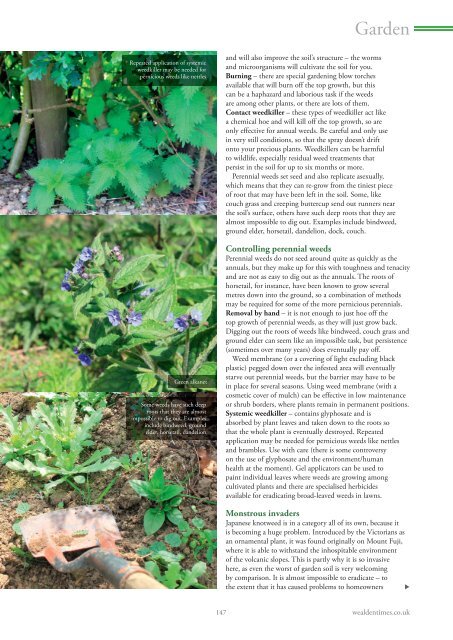Wealden Times | WT184 | June 2017 | Kitchen & Bathroom supplement inside
Wealden Times - The lifestyle magazine for the Weald
Wealden Times - The lifestyle magazine for the Weald
You also want an ePaper? Increase the reach of your titles
YUMPU automatically turns print PDFs into web optimized ePapers that Google loves.
Garden<br />
Repeated application of systemic<br />
weedkiller may be needed for<br />
pernicious weeds like nettles<br />
Green alkanet<br />
Some weeds have such deep<br />
roots that they are almost<br />
impossible to dig out. Examples<br />
include bindweed, ground<br />
elder, horsetail, dandelion<br />
and will also improve the soil’s structure – the worms<br />
and microorganisms will cultivate the soil for you.<br />
Burning – there are special gardening blow torches<br />
available that will burn off the top growth, but this<br />
can be a haphazard and laborious task if the weeds<br />
are among other plants, or there are lots of them.<br />
Contact weedkiller – these types of weedkiller act like<br />
a chemical hoe and will kill off the top growth, so are<br />
only effective for annual weeds. Be careful and only use<br />
in very still conditions, so that the spray doesn’t drift<br />
onto your precious plants. Weedkillers can be harmful<br />
to wildlife, especially residual weed treatments that<br />
persist in the soil for up to six months or more.<br />
Perennial weeds set seed and also replicate asexually,<br />
which means that they can re-grow from the tiniest piece<br />
of root that may have been left in the soil. Some, like<br />
couch grass and creeping buttercup send out runners near<br />
the soil’s surface, others have such deep roots that they are<br />
almost impossible to dig out. Examples include bindweed,<br />
ground elder, horsetail, dandelion, dock, couch.<br />
Controlling perennial weeds<br />
Perennial weeds do not seed around quite as quickly as the<br />
annuals, but they make up for this with toughness and tenacity<br />
and are not as easy to dig out as the annuals. The roots of<br />
horsetail, for instance, have been known to grow several<br />
metres down into the ground, so a combination of methods<br />
may be required for some of the more pernicious perennials.<br />
Removal by hand – it is not enough to just hoe off the<br />
top growth of perennial weeds, as they will just grow back.<br />
Digging out the roots of weeds like bindweed, couch grass and<br />
ground elder can seem like an impossible task, but persistence<br />
(sometimes over many years) does eventually pay off.<br />
Weed membrane (or a covering of light excluding black<br />
plastic) pegged down over the infested area will eventually<br />
starve out perennial weeds, but the barrier may have to be<br />
in place for several seasons. Using weed membrane (with a<br />
cosmetic cover of mulch) can be effective in low maintenance<br />
or shrub borders, where plants remain in permanent positions.<br />
Systemic weedkiller – contains glyphosate and is<br />
absorbed by plant leaves and taken down to the roots so<br />
that the whole plant is eventually destroyed. Repeated<br />
application may be needed for pernicious weeds like nettles<br />
and brambles. Use with care (there is some controversy<br />
on the use of glyphosate and the environment/human<br />
health at the moment). Gel applicators can be used to<br />
paint individual leaves where weeds are growing among<br />
cultivated plants and there are specialised herbicides<br />
available for eradicating broad-leaved weeds in lawns.<br />
Monstrous invaders<br />
Japanese knotweed is in a category all of its own, because it<br />
is becoming a huge problem. Introduced by the Victorians as<br />
an ornamental plant, it was found originally on Mount Fuji,<br />
where it is able to withstand the inhospitable environment<br />
of the volcanic slopes. This is partly why it is so invasive<br />
here, as even the worst of garden soil is very welcoming<br />
by comparison. It is almost impossible to eradicate – to<br />
the extent that it has caused problems to homeowners<br />
<br />
147 wealdentimes.co.uk


















